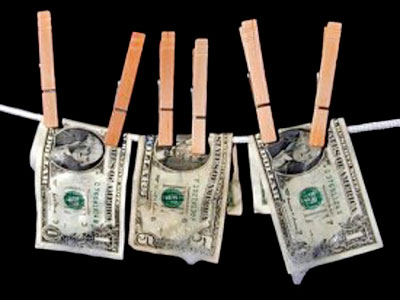
by Ed Vulliamy
2 June 2012
from
TheGuardian Website
|
'Anti-Drugs Policies In
Colombia: Successes, Failures And Wrong Turns,'
edited by Alejandro Gaviria and Daniel Mejía,
Ediciones Uniandes, 2011
While cocaine production ravages
countries in Central America, consumers in the US and Europe are
helping developed economies grow rich from the profits, a study
claims |

Soldiers torch a cocaine processing laboratory
near the city of Cucuta, in
northern Colombia, as part of the country's war on drugs.
Photograph: AFP/Getty
Images
The vast profits made from drug production and trafficking are
overwhelmingly reaped in rich "consuming" countries - principally across
Europe and in the US - rather than war-torn "producing" nations such as
Colombia and Mexico, new research has revealed.
And its authors claim that financial regulators
in the west are reluctant to go after western banks in pursuit of the
massive amount of drug money being laundered through their systems.
The most far-reaching and detailed analysis to date of the drug economy in
any country - in this case, Colombia - shows that 2.6% of the total street
value of cocaine produced remains within the country, while a staggering
97.4% of profits are reaped by criminal syndicates, and laundered by banks,
in first-world consuming countries.
"The story of who makes the money from
Colombian cocaine is a metaphor for the disproportionate burden placed
in every way on 'producing' nations like Colombia as a result of the
prohibition of drugs," said one of the authors of the study,
Alejandro Gaviria, launching its English edition last week.
"Colombian society has suffered to almost no economic advantage from the
drugs trade, while huge profits are made by criminal distribution
networks in consuming countries, and recycled by banks which operate
with nothing like the restrictions that Colombia's own banking system is
subject to."
His co-author, Daniel Mejía, added:
"The whole system operated by authorities in
the consuming nations is based around going after the small guy, the
weakest link in the chain, and never the big business or financial
systems where the big money is."
The work, by the two economists at University of
the Andes in Bogotá, is part of an initiative by the Colombian government to
overhaul global drugs policy and focus on money laundering by the big banks
in America and Europe, as well as social prevention of drug taking and
consideration of options for de-criminalizing some or all drugs.
The economists surveyed an entire range of economic, social and political
facets of the drug wars that have ravaged Colombia.
The conflict has now shifted, with deadly
consequences, to Mexico and it is feared will spread imminently to central
America. But the most shocking conclusion relates to what the authors call
"the microeconomics of cocaine production" in their country.
Gaviria and Mejía estimate that the lowest possible street value (at $100
per gram, about £65) of "net cocaine, after interdiction" produced in
Colombia during the year studied (2008) amounts to $300bn.
But of that only $7.8bn remained in the country.
"It is a minuscule proportion of GDP," said
Mejía, "which can impact disastrously on society and political life, but
not on the Colombian economy. The economy for Colombian cocaine is
outside Colombia."
Mejía told the Observer:
"The way I try to put it is this:
prohibition is a transfer of the cost of the drug problem from the
consuming to the producing countries."
"If countries like Colombia benefitted economically from the drug trade,
there would be a certain sense in it all," said Gaviria. "Instead, we
have paid the highest price for someone else's profits - Colombia until
recently, and now Mexico.
"I put it to Americans like this - suppose all cocaine consumption in
the US disappeared and went to Canada. Would Americans be happy to see
the homicide rates in Seattle skyrocket in order to prevent the cocaine
and the money going to Canada?
That way they start to understand for a
moment the cost to Colombia and Mexico."
The
mechanisms of laundering drug money were
highlighted in the Observer last year after a rare settlement in Miami
between US federal authorities and the Wachovia bank, which admitted to
transferring $110m of drug money into the US, but failing to properly
monitor a staggering $376bn brought into the bank through small exchange
houses in Mexico over four years. (Wachovia has since been taken over by
Wells Fargo, which has co-operated with the investigation.)
But no one went to jail, and the bank is now in the clear.
"Overall, there's great reluctance to go
after the big money," said Mejía.
"They don't target those parts of the chain
where there's a large value added. In Europe and America the money is
dispersed - once it reaches the consuming country it goes into the
system, in every city and state. They'd rather go after the petty
economy, the small people and coca crops in Colombia, even though the
economy is tiny."
Colombia's banks, meanwhile, said Mejía,
"are subject to rigorous control, to stop
laundering of profits that may return to our country. Just to bank
$2,000 involves a huge amount of paperwork - and much of this is
overseen by Americans."
"In Colombia," said Gaviria, "they ask questions of banks they'd never
ask in the US. If they did, it would be against the laws of banking
privacy. In the US you have very strong laws on bank secrecy, in
Colombia not - though the proportion of laundered money is the other way
round. It's kind of hypocrisy, right?"
Dr Mejia said:
"It's an extension of the way they operate
at home. Go after the lower classes, the weak link in the chain - the
little guy, to show results. Again, transferring the cost of the drug
war on to the poorest, but not the financial system and the big business
that moves all this along."
With Britain having overtaken the US and Spain
as the world's biggest consumer of cocaine per capita, the Wachovia
investigation showed much of the drug money is also laundered through
the
City of London, where the principal Wachovia whistleblower, Martin Woods,
was based in the bank's anti-laundering office.
He was wrongfully dismissed after sounding the
alarm.
Gaviria said:
"We know that authorities in the US and UK
know far more than they act upon. The authorities realize things about
certain people they think are moving money for the drug trade - but the
DEA [US Drugs Enforcement Administration] only acts on a fraction of
what it knows."
"It's taboo to go after the big banks," added Mejía. "It's political
suicide in this economic climate, because the amounts of money recycled
are so high."
Denuncian que Europa y EE.UU....
Lavan el Dinero del Narcotráfico
5 Junio 2012
del Sitio Web
RadioGremial

La investigación más extensa realizada hasta la fecha sobre el poder
económico del narcotráfico parece haber confirmado la leyenda popular de que
el negocio de la droga recae fundamentalmente en los países que consumen
sustancias como la cocaína, más que en los países que las producen.
El diario británico The Guardian publicó un reporte sobre el estudio
“Anti-Drugs Policies In Colombia: Successes, Failures And Wrong Turns”,
realizado por los investigadores Alejandro Gaviria y Daniel Mejía.
El estudio revela que sólo el 2.6% del valor que genera la cocaína producida
en Colombia permanece en ese país, mientras que el restante 97.4% es
capitalizado por sindicatos y bancos que lavan el dinero en países
consumidores de primer mundo.
Este minúsculo derrame económico contrasta con la gran cantidad de violencia
que se genera en los países donde se produce la droga - y donde se centra la
guerra contra la droga.
Gaviria, uno de los autores, hace una provocadora
analogía:
“¿Que pensarían los estadounidenses si los índices de homicidios
se dispararan en Seattle porque el consumo y el negocio de la cocaína
estuviera migrado a Canadá?”.
Se calcula que la cocaína colombiana es un
negocio de 300 mil millones de dólares al año, de los cuales sólo 7.8 mil
millones se quedan en Colombia.
“Si los países como Colombia se beneficiaran económicamente del tráfico de
drogas, habría un cierto sentido en todo esto. Sin embargo, hemos pagado el
precio de las ganancias de otros”, recalcó Gaviria.
Daniel Mejía añade que existe una gran diferencia entre la regulación en los
bancos colombianos y los bancos en países como Estados Unidos, donde no se
investiga el lavado de dinero con el mismo escrutinio.
“Todo el sistema
operado por las autoridades en las naciones consumidoras está basado en ir
detrás del pequeño productor, el más débil en la cadena y nunca detrás del
gran negocio y de los sistemas financieros donde están las grandes
cantidades de dinero…
Es tabú perseguir a los grandes bancos. Es suicidio
político en este clima económico porque las cantidades de dinero reciclado
son tan altas”.
Hace dos años se inició una investigación al banco Wachovia (ahora Wells
Fargo) por lavar 380 millones de dólares del narco mexicano.
El banco
admitió haber transferido 110 millones de dólares de México a Estados Unidos
y no monitorear 380 millones de dólares. Dos años después el banco ha sido
absuelto y nadie ha ido a la cárcel.
Esta es la imperante impunidad de estas
instituciones que son “demasiado grandes para caer”.


